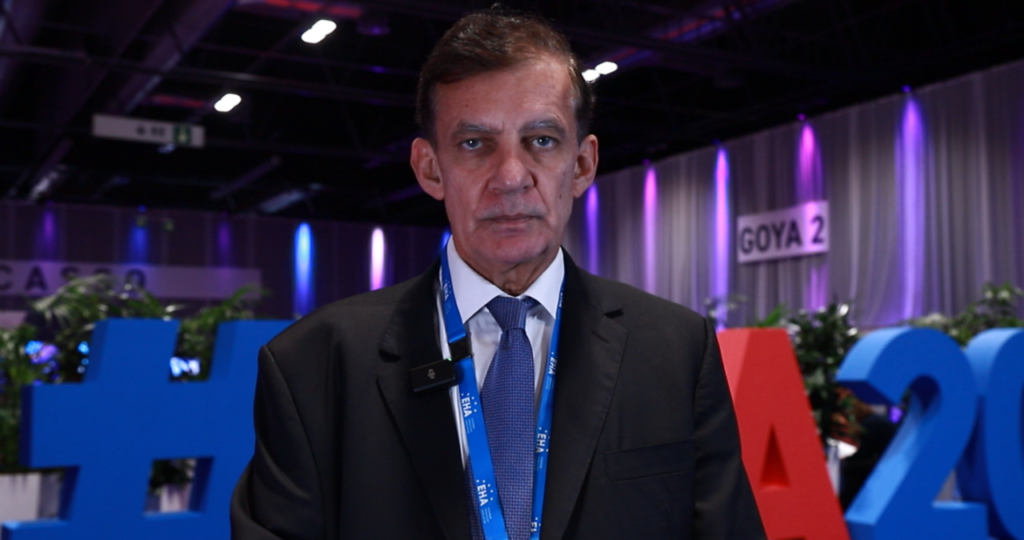
With the rapid development in the field of hematology, new treatment strategies and breakthrough advancements continue to emerge, offering new hope for patients with hematological malignancies. At the 2024 EHA conference, "Oncology Frontier-Hematology Frontier" had the honor of interviewing Professor Meletios A. Dimopoulos from the School of Medicine, National and Kapodistrian University of Athens School of Medicine, delving into the challenges currently faced in the treatment of hematological malignancies, especially for those patients who are refractory to traditional treatments such as lenalidomide and anti-CD38 monoclonal antibody therapy. Professor Dimopoulos' phase 3 DREAMM-8 study data demonstrated the potential and advantages of the B-Pd combination treatment regimen, providing a new option for second-line treatment.Oncology Frontier-Hematology Frontier: Dr. Dimopoulos, belantamab mafodotin with pomalidomide and dexamethasone (B-Pd) regimen demonstrates a significant advantage in enhancing both the quality and duration of responses observed in our simulations,does this mean that B-Pd could become an option after the first-line treatment?
Dr. Dimopoulos: Yes, because now many patients progress on lenalidomide maintenance, and we will have more patients progressing on anti-CD38 monoclonal antibodies as well. Thus, a combination that includes pomalidomide and dexamethasone with belantamab mafodotin could become a standard of care for second-line therapy, especially for patients who have failed lenalidomide and anti-CD38 monoclonal antibodies.
Oncology Frontier-Hematology Frontier:The study showed that the B-Pd regimen significantly improved progression-free survival (PFS) in patients compared to the standard of care. What does this result imply for future treatment strategies?
Dr. Dimopoulos:This implies that now we know for patients who have progressed on lenalidomide and daratumumab, we have the PVd regimen, carfilzomib dexamethasone regimen, and the carfilzomib pomalidomide dexamethasone regimen. I believe that the data from this large phase 3 study showing that belantamab mafodotin with pomalidomide and dexamethasone is superior to PVd, we establish B-Pd as a standard of care.
Oncology Frontier-Hematology Frontier: what are the implications of the study’s starting results for relapsed/refractory patients who have received prior anti-CD38 therapy, and does the B-Pd regimen offer a new therapeutic option?
Dr. Dimopoulos: Certainly. In our study, approximately 25% of patients had failed treatment with anti-CD38 monoclonal antibodies. These patients experienced significant benefits from the combination of belanta momafodotin, pomalidomide, and dexamethasone. This combination therapy provides a new, effective option for patients who have progressed on treatments like daratumumab or isatuximab. The efficacy observed in these patients highlights the potential of this regimen to improve outcomes where other therapies have failed.
Oncology Frontier-Hematology Frontier: How do you envision the future of second-line therapies evolving with these new findings?
Dr. Dimopoulos: The success of this combination therapy opens up new avenues for second-line treatments. As we continue to gather more data and refine our approaches, I anticipate that more personalized and targeted regimens will become available. This will not only improve patient outcomes but also offer more options for those who have exhausted standard treatments. Future research will likely focus on further optimizing these combinations and exploring their benefits in broader patient populations.
Oncology Frontier-Hematology Frontier: Looking ahead to next year’s EHA meeting in Milan, what are your expectations for the advancements in hematology?
Dr. Dimopoulos: The EHA meetings are always a highlight for the hematology community, offering a platform to share the latest research and clinical advancements. Next year in Milan, I expect to see continued progress in the development of targeted therapies and personalized medicine. These advancements will undoubtedly bring new hope and improved treatments for patients. We’re looking forward to another exciting and productive meeting.


